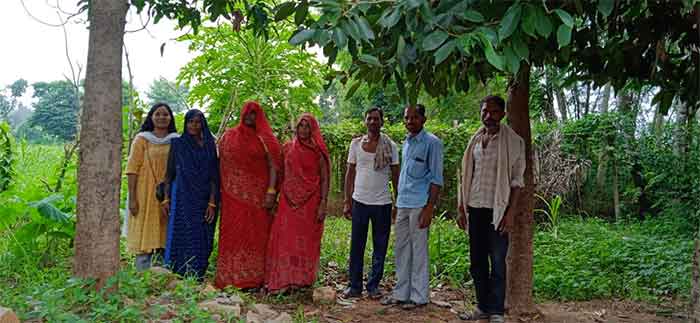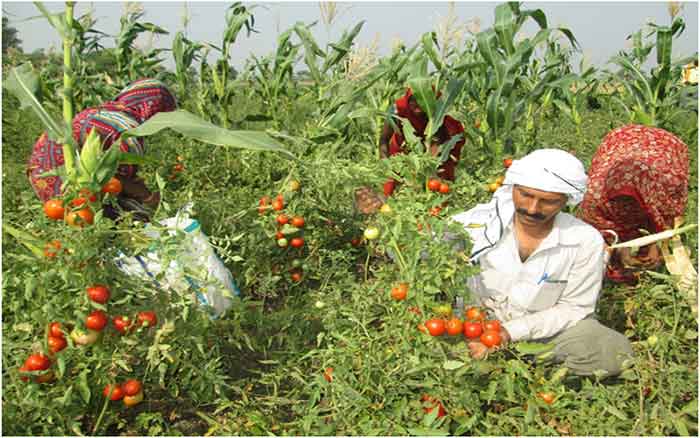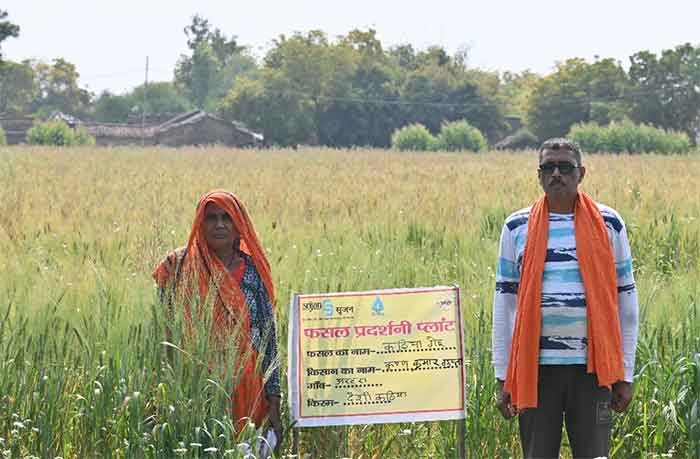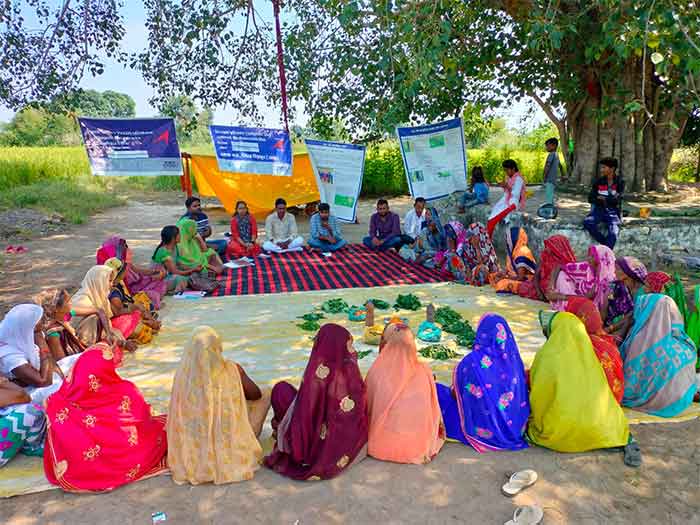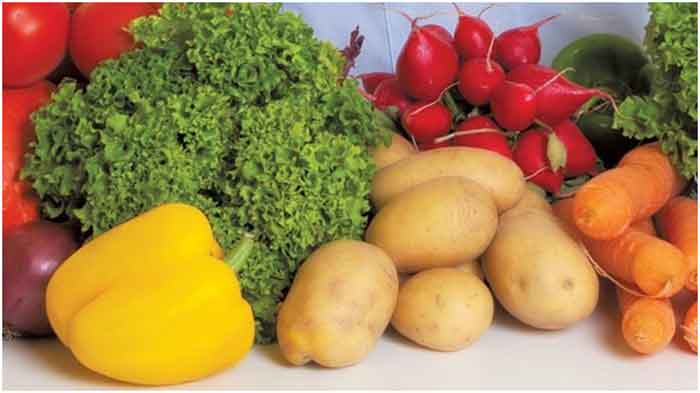
An assortment of organically grown produce lay out at a Farmer’s Market
Prior to this pandemic summer, every year from May to November — there was something magical about waking up on Sunday mornings. I could walk three blocks from my house to the open space under large Walnut trees near the Hospital to get a week’s worth of organic fruits and vegetables from the Farmers Market. After that, winter would set in and the outside market wrapped up until next spring. For the next five months, I would buy from either the supermarket’s organic section or the organic market called the Roots in my neighbourhood. We have been buying organic produce for over ten plus years now. Many people used to ask me why I pay thrice the amount to buy locally grown organic vegetables instead of the imported variety that are grown conventionally which often comes from Mexico and other South American countries.
My answer has always been simple: The organic products are grown without any “synthetic fertilisers, pesticides, herbicides, fungicides, hormones or antibiotics.” If one can avoid products devoid of such harmful things in order to maintain a healthy body — isn’t the extra price worth it? That answer would usually shut people up. Organic farming also plays a great role in protecting the environment. “The organic market has expanded substantially to include grains, meat, dairy, and even processed foods, in addition to produce. It has also spilled over to the foodservice industry where it is common to see “organic” on a menu. And, it’s not just limited to food items; nonfood products including alcohol, textiles and personal care products can also be organic. It’s clear there’s great opportunity to be had in taking advantage of the demand for organic products.”
From environmentally conscientious everyday citizens to heads of states such as Sheikh Hasina of Bangladesh have been campaigning for organic farming for a few years now. She regularly emphasizes to the farmers about the importance of growing organic products. Organic produce has become a global phenomenon with a great global demand. I have listened to some of her speeches where she had encouraged the people in the agricultural sector to consider this global trend as a means to increase export. She believes Bangladesh could immensely benefit from organic farming as the organic produce cost higher, therefore, adding to the country’s total remittance. She urged its youth community to take up this opportunity as a means of employment. “A special demand for organic foods has been created across the globe. Bangladesh could exploit this opportunity as the prices of organic foods are much higher than the foods produced through chemical fertilisers, and the youth force could voluntarily take initiative to this end,” she said a few years back. Since the pandemic hit Bangladesh it could not keep up with the food supply chain flow as the farmers and growers cannot keep on supplying to the city dwellers because of ban on transportation and other risk factors. From day one since the coronavirus showed its ugly face in Bangladesh, PM Hasina has been telling people not to fear food shortage. She has been urging through her media briefings for people to utilize every piece of unattended land by growing vegetables in order to avoid hunger. If there is no supply of fresh vegetables then “grow it yourself,” is what she told her country people. Good advice as a lot of people in the city lives in high-rises and has access to a roof where they can have veggie gardens. But it is the poor people who are starving as they cannot earn their daily wages because of lockdown and social distancing. Nor do they own a piece of land to grow veggies.
Another environmentally conscientious and champion of organic farming was former US First Lady Michelle Obama while she had lived in the White House. She had an exceptional educational background and a very successful law career before entering the White House. Many thought like Hillary Clinton, Michelle will also be guiding the president in every decision that he takes. But to everyone’s surprise, she opted for more of a traditional role of an American First Lady by doing things out of the limelight.
With a few seedlings in her hand, one spring morning in 2009 Michelle Obama had started her little organic garden on the back lawn of the White House. Since then the conversation never stopped. From 1,100 square feet, the garden had grown over the years and it supplied fresh produce to the White House kitchen. About one third of the harvest was donated to a local organization called Meriam’s Kitchen that helps homeless people in the Washington DC area.
As an avid campaigner of childhood obesity prevention, Michelle Obama also used her garden as an educational tool. Every spring, she opened up her garden for the city schoolchildren who never had a vegetable garden before. They came to help her to plant vegetables, fruits and herbs. They also got a lesson on healthy eating as many city kids are on the brink of obesity due to lack of playgrounds in Washington DC. In low-income neighborhoods there are hardly any motivations to grow vegetables as people have so many other problems.
Michelle Obama became a celebrity gardener who was gracing the cover pages of magazines like Better Homes and Gardens. Obama wrote an in-depth piece about how she became a gardener, for a publication called Mother Earth News. Inspired by her, many city folks since then have been planting vegetables in terracotta pots in their balconies, porches or in small patches behind their city homes as space is sparse. Other than Mrs. Obama, First Lady Eleanor Roosevelt had her own garden called the World War II victory garden where vegetables grew and supplied the White House kitchen. Health conscious people now have started to play a vital role about what each family eats. The health enthusiast suburban communities are more and more growing their own food in their back yards and other vacant patches as well.
In Maryland, agriculture plays a dominant role in earning a livelihood. About 350,000 people were working in agricultural sector in some capacity before the coronavirus came to town. According to a 2014 census, some 12,300 farms and over 7,500 acres are certified as organic in Maryland.
The benefits of organic products: What is really driving the organic food market? The first and foremost benefit is that going organic will protect us against cancer that is often triggered by the pesticides that seep into our fruits and vegetables. Organic purity, without a doubt reduces health risks as it has been proven to be a deterrent to many diseases. Most plants produce something called Flavonoids which protects the plants against several diseases and as a result, we become the direct beneficiary as it is high in antioxidants. Research shows that insecticides and herbicides interfere with the production of these protective compounds, thus exposing us to numerous harmful illnesses. Antioxidants play a major role in keeping our body healthy.
Antioxidants are a combination of minerals, vitamins and other nutrients. According to the 2005 State of Science Review (SSR) by the Organic Center, “antioxidant levels are about 30 percent higher in organic food than chemically-grown foods produced under the same conditions. Most antioxidants are found in the peels of fruits and vegetables, but many people cut away the peel of conventionally grown produce to reduce their exposure to pesticides. Since it is safer to eat the skin of an organic fruit or vegetable, you get the maximum amount of antioxidants from your produce when you buy organic.” Organic products are rich in Vitamin E, C and Beta-Carotene which help fight cancer cells and prevent other diseases.
Nearly a two-decade old study revealed, today’s conventionally grown, non-organic fruits and vegetables have about half the vitamin content of their 1963 counterparts. Organically grown food is more nutritious than food produced using synthetic chemicals, as shown by a study published in the Journal of Applied Nutrition. “On average, organically grown food is 63 percent higher in calcium, 73 percent higher in iron and 118 percent higher in magnesium, while being 29 percent lower in mercury.” By using only organic products, we can almost eliminate chemicals in our diet. Moreover, those food products those are free of dangerous chemicals and pesticides taste better.
“It’s not just their own health that consumers are thinking about. People who are unhappy with the treatment of animals but are not ready to turn to veganism eat organic meat and dairy as an alternative. Regulations regarding organic status extend to how animals are raised. They cannot be given synthetic hormones or antibiotics, and must be fed organic feed. After all, if you don’t want to eat GMOs, do you want your food to eat GMOs either?” Organic products address environmental, animal welfare and health concerns by encompassing hormones and antibiotics given to animals. Animals are also given safe, clean living and enough roaming areas when they venture outside. Genetically modified organisms and synthetic fertilizers used in crops, and sustainability practices for the environment are issues for the consumers. We have seen an increase in popularity of going all organic in the recent years, and the organic market benefits in each of these cases. “What’s more, the market doesn’t show signs of slowing. Consumers of organic products are skewing young, and there’s an uptick when women become pregnant or a family has young children. Those demographics get larger each year, as is the opportunity for more companies to get on board and have a piece of the organic pie.”
Many people often think that eating healthy means cutting out only junk food from their diet. But healthy eating is more than that – the focus should be whether we are getting the most in nutritional value from our fruits and vegetables. In weighing the benefits of organic food in many health journals, the experts have shown that now they have a better understanding of how disease and environmental toxins are interlinked. They have proven that exposure to chemical fertilisers and pesticides through food greatly affect our health. “Some pesticides have been shown to disrupt the human endocrine system (which regulates our hormones), while others have been linked to breast cancer, uterine cancer and asthma.”
“The general population is becoming more aware of what goes into their bodies, and the information about what’s going into their bodies is more readily available via documentaries and the ease of research on the internet. “Super-Size Me” made waves in the early 2000s, but many lesser known documentaries and educational films or series have become widely available. These films cover animal welfare, the food industry’s impact on the environment, and ingredients and chemicals in food products. They may not be on the big screen at a local theater near you, but they are making an impact on those who watch them.”
People who are sceptics should know that the organic food and vegetables that are grown here do adhere to international standards and is USDA (agriculture department) certified. Organic farming is planet friendly because fertilisers, pollutants and chemicals cannot seep into ground water and there is no risk of water contamination. Organic farmers only use homemade composts composed from organic matters and straws as opposed to any kind of fertilisers and pesticides that are used for plants to enhance rapid growth.
Organic farming also helps the local farmers by getting rid of the middle men, thus revitalizing the local economy and creating a sustainable livelihood for them. By using traditional knowledge, the farmers can grow environmentally friendly products without using a lot of capital to do that. Throughout the world, the small farmers can hugely benefit by producing organic products which they can sell at a higher price because of the care that go into it. Such small scale farming can help reduce poverty drastically in the developing countries. In the USA, local harvests in abundance are sold in super markets and farmer’s markets, thus providing a valuable service in bringing communities together.
Only one percent of US cropland is organic and organic farming is slower, harder and labour-intensive but these farmers are committed to supporting practices that respects our planet. We should remember that the organic producers use cultivation practices that keep the nearby waterbodies free of contaminants. There is minimum loss of top soil and valuable nutrients.
Organic farming also creates harmony with nature by producing nutritious food that nourish our body and help the environment in the process. This method of farming has added to the holistic approach to food consumption and people are paying more attention to their wellness and way of life. To have a healthy body and to preserve the earth, it is a no brainer why so many are opting for organic produce now-a-days.
No emotion is comparable while holding a fresh and a delicious tomato or a pumpkin that has been freshly cut from a vine or a patch. It is a very satisfying sensation knowing that the farmer in jeans overall himself has grown the fresh variety and the sugar free blackberry jam that I often used to get for 8 bucks was made by his wife in their kitchen without using any preservatives.
Over the years, I have come to respect nature and food which contain natural ingredients. Hence, adding the extra 30 dollars to my weekly supply of organic fruits and vegetables that were not exposed to harmful agricultural chemicals is worth the extra amount. Eating conventionally grown fruits and vegetables will only increase my risks of getting an incurable disease. When we sit down to eat, I know that by buying organic products, we are living less toxically.
Regrettably, the vegetables that I have been getting for the last 4 months through online orders, I really cannot say with utmost certainty whether the person in the grocery store is actually putting the organic fruits & veggies in my shopping bag while filling the order. With milk & eggs I know that they are organic as it is clear from the packaging. Now most produce in my grocery bags as we clean and put them away, I do not always see the certified organic label or mini stickers attached to the fruits & veggies. This has attributed to a growing concern and causing me some agitation instead of a cause for celebration at every lunch and dinner time since the pandemic started. Tonight, we are away from home for a couple of days at the Timeshare beach house and just about ready to cook the veggies and lentils for supper that I brought from home. But for some reason I am unable to feel excitement. Typically, on such a perfect summer evening after a much needed rain, we used to join a couple of close friends at the small Italian restaurant Ricciuti’s in my neighborhood for dinner. The restaurant only uses locally grown organic produce. An average fruit and vegetable platter costs $18 or more. By using only organic products, the restaurant is supporting the small farmers in the area and we are supporting a local business. It’s a win-win for everyone but not anymore. The pandemic took that pleasure away from us to serve the community. The restaurant is not operational this summer, and it shows a front window display sign that reads: “This restaurant is closed until further notice.”
Zeenat Khan writes from Dewey Beach, Delaware, United States
SIGN UP FOR COUNTERCURRENTS DAILY NEWSLETTER

